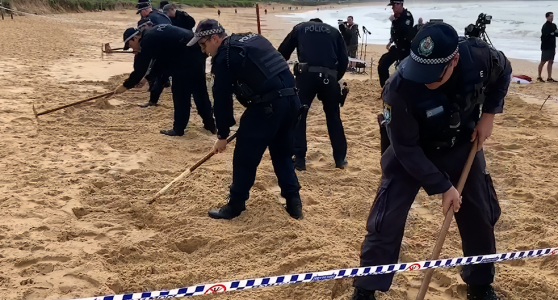Jawbone Discovery on Aussie Beach Cracks Open a 44-Year-Old Mystery - Find Out the Shocking Truth!
By
Gian T
- Replies 5
In a remarkable turn of events that sounds like something straight out of a detective novel, a jawbone found on an Australian beach has solved a tragic mystery that has puzzled authorities for over four decades. The discovery, which has brought closure to a long-standing case, highlights the incredible advances in forensic science and the enduring importance of community involvement in missing persons investigations.
The jawbone, which was discovered by a dog walker on Umina Beach, near Sydney Avenue on the NSW Central Coast, in June 2020, was initially a perplexing find. Despite being blackened and weathered by time, the bone was in a surprisingly good condition, with some teeth still intact. At the time, police confirmed the remains were human, but traditional investigative methods failed to identify the deceased.
Fast forward to March 2023, and detectives have finally cracked the case, thanks to cutting-edge 'DNA analysis techniques' that were not available at the time of the drowning. By combining these new techniques with traditional genealogy, which involves using commercial DNA databases to identify suspects and unknown remains, a breakthrough was made.
The collaborative efforts of detectives, scientists, and analysts led to the exclusion of two other cases and the identification of a genetic link to a possible living relative. A voluntary DNA sample from the relative confirmed that the jawbone belonged to Henry Coleman, a teenager who tragically drowned in 1980, nearly half a century ago.
Henry Coleman was only 17 when he met his untimely death on the Central Coast. He was laid to rest in the 1980s, but it was not known at the time that part of his jaw was missing. The recent identification of his remains has finally allowed for a complete burial and provided his family with long-awaited answers.
Detective Inspector Ritchie Sim emphasized the significance of this case, stating, 'This investigation showcases the importance of DNA testing in missing person cases. Without the amazing, combined work by our detectives, scientists, and analysts, we never would have been able to return these remains to their resting place and find answers for Mr. Coleman’s family.'
The resolution of this case comes during Missing Persons Week, a time when the public is urged to come forward with any information that could help solve other missing persons cases. Detective Inspector Sim reassured the public that the DNA provided for these investigations is not used for criminal matters and is not stored in any criminal or suspect database.
For our readers at the Seniors Discount Club, this story serves as a reminder of the power of science and the importance of community support in bringing solace to families affected by loss. It also underscores the value of persistence and the potential for even the most challenging cases to be solved with the help of modern technology.
If you have a family member who has been reported missing, Detective Inspector Sim's message is clear: providing your DNA could be the key to unlocking the mystery, even if your relationship with the missing person spans several generations.
The resolution of Henry Coleman's case is a testament to the dedication of those who work tirelessly to solve such mysteries and the profound impact their work has on the lives of those left behind.
 Have you or someone you know been touched by a missing person's case? How do you feel about the advancements in DNA technology aiding these investigations? Share your thoughts and experiences in the comments below.
Have you or someone you know been touched by a missing person's case? How do you feel about the advancements in DNA technology aiding these investigations? Share your thoughts and experiences in the comments below.
The jawbone, which was discovered by a dog walker on Umina Beach, near Sydney Avenue on the NSW Central Coast, in June 2020, was initially a perplexing find. Despite being blackened and weathered by time, the bone was in a surprisingly good condition, with some teeth still intact. At the time, police confirmed the remains were human, but traditional investigative methods failed to identify the deceased.
Fast forward to March 2023, and detectives have finally cracked the case, thanks to cutting-edge 'DNA analysis techniques' that were not available at the time of the drowning. By combining these new techniques with traditional genealogy, which involves using commercial DNA databases to identify suspects and unknown remains, a breakthrough was made.
The collaborative efforts of detectives, scientists, and analysts led to the exclusion of two other cases and the identification of a genetic link to a possible living relative. A voluntary DNA sample from the relative confirmed that the jawbone belonged to Henry Coleman, a teenager who tragically drowned in 1980, nearly half a century ago.
Henry Coleman was only 17 when he met his untimely death on the Central Coast. He was laid to rest in the 1980s, but it was not known at the time that part of his jaw was missing. The recent identification of his remains has finally allowed for a complete burial and provided his family with long-awaited answers.
Detective Inspector Ritchie Sim emphasized the significance of this case, stating, 'This investigation showcases the importance of DNA testing in missing person cases. Without the amazing, combined work by our detectives, scientists, and analysts, we never would have been able to return these remains to their resting place and find answers for Mr. Coleman’s family.'
The resolution of this case comes during Missing Persons Week, a time when the public is urged to come forward with any information that could help solve other missing persons cases. Detective Inspector Sim reassured the public that the DNA provided for these investigations is not used for criminal matters and is not stored in any criminal or suspect database.
For our readers at the Seniors Discount Club, this story serves as a reminder of the power of science and the importance of community support in bringing solace to families affected by loss. It also underscores the value of persistence and the potential for even the most challenging cases to be solved with the help of modern technology.
If you have a family member who has been reported missing, Detective Inspector Sim's message is clear: providing your DNA could be the key to unlocking the mystery, even if your relationship with the missing person spans several generations.
The resolution of Henry Coleman's case is a testament to the dedication of those who work tirelessly to solve such mysteries and the profound impact their work has on the lives of those left behind.
Key Takeaways
- Australian police have identified a jawbone found on Umina Beach in 2020 as belonging to Henry Coleman, a teenager who drowned in 1980.
- The identification was made possible through advanced DNA analysis techniques and traditional genealogy using commercial DNA databases.
- This breakthrough demonstrates the importance of DNA testing in resolving missing persons cases, coupled with public assistance.
- Detective Inspector Ritchie Sim encourages people who have reported family members missing to provide their DNA to help solve cases and offers reassurance that the DNA will not be used for criminal investigations.








